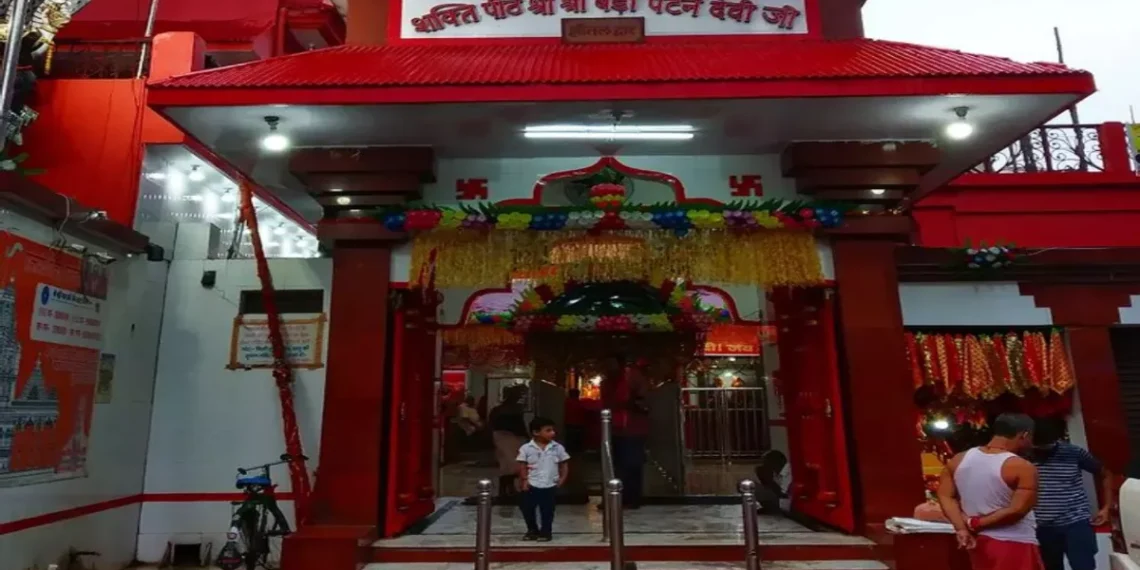Patan Devi Temple, located in Patna, Bihar close to the Ganges, is dedicated to Goddess Durga, also commonly called Maa Patneshwari. It is counted among India’s 51 Siddha Shakti Peethas, highly regarded for its spiritual power. The complex comprises two main shrines: Badi Patan Devi in Maharajganj and Chhoti Patan Devi in Chowk, both linked to ancient local legends and traditions.
History of Patan Devi Temple
Patan Devi Temple is said to date back to the Mauryan era, around 300 BCE, when Emperor Ashoka ruled. The present buildings, however, were likely built between the 9th and 11th centuries CE, with major repairs by Man Singh, a general under Mughal Emperor Akbar, in the 1500s–1600s. Historical records note it as one of Patna’s oldest shrines, linked to the city’s ancient name, Pataliputra. British writer Buchanan mentioned in the 18th–19th centuries that Chhoti Patan Devi was then the main deity of Patna, though Badi Patan Devi later became more prominent.
Badi Patan Devi is in Maharajganj, reached through narrow lanes, while Chhoti Patan Devi is in Chowk, about 4 km away, also along narrow streets. After independence in 1947, a local trust took over both temples.
Legends of Patan Devi Temple
The Patan Devi temples are steeped in legends and local beliefs about Goddess Durga. One well-known story tells that when Sati, Lord Shiva’s wife, immolated herself at her father’s yajna, Shiva, grieving, carried her body. To relieve his sorrow, Lord Vishnu used his Sudarshan Chakra to cut her body, and her right thigh fell at Magadh, Maharajganj for Badi Patan Devi and Chowk for Chhoti Patan Devi, prompting the establishment of these Shakti Pithas. Another tale speaks of three goddesses, Mahakali, Mahalakshmi, and Mahasaraswati, who protected Putraka, the founder of Pataliputra, adding to the sanctity of these sites.
At Badi Patan Devi, locals point to a mysterious stone discovered in a temple tank, now kept in the eastern veranda and worshiped daily. Chhoti Patan Devi has a deep well believed to hold sacred power. Devotees believe that sincere prayers at either temple can bring wealth, safety, and peace of mind. Legends also tell that Durga fought and defeated the demon Mahishasura at these locations, symbolizing her supreme power. During Navratri, the goddess’s presence is said to be especially strong at both temples.
Architecture of Patan Devi Temple
Badi Patan Devi faces north, toward the Ganges, built in a mix of North Indian Nagara and Mughal styles. Its shikhara, a tall curvy spire, has carvings of gods and tales from Hindu stories. The main shrine holds black stone idols of Mahakali (12 inches), Mahalakshmi (6 inches), Mahasaraswati (12 inches), and Bhairav (3 inches), set on thrones about 7 feet high and 4 feet square. A portico at the entrance is 1.5 by 15 feet, leading to an 8-by-8-foot room for the idols. A havan kund sits in front for fire rituals.
Chhoti Patan Devi, in Chowk, has a simpler look but also holds black stone idols of Mahakali, Mahalakshmi, Mahasaraswati, plus Vishnu, Shiva, and Bhairav, some found when the temple was made. Old carvings, like Ganesh, Vishnu, and a broken Surya, point to a 9th–11th century build, maybe fixed by Man Singh. A deep well near Badi Patan Devi, from Mauryan times, has brick at the top for 43 feet and wooden rings below for 62 feet.
Rituals and Festivals
The Badi and Chhoti Patan Devi Temples in Patna see the most activity during Navratri, celebrated in April and October. Nearby, the Ganges attracts visitors for Chhath Puja.
Each day, priests bathe the idols, perform aarti with bells, and offer prasad. Two types of puja take place: a longer Vedic ritual with chants, and a brief Tantric ritual conducted daily without public presence. Tuesdays are considered special, drawing newlyweds and parents seeking blessings. Smaller festivals like Diwali, Holi, and Janmashtami also bring devotees. During major celebrations, free meals are served to thousands, and the temple atmosphere is filled with flowers, lamps, and devotion.
Information for Travelers
Hours and Entry: Open every day, 6:00 AM to 10:00 PM. It’s free to go in, but offerings cost ₹20–100.
How to Get There:
Air: Jay Prakash Narayan Airport in Patna is 24 km off, with flights to Delhi (1.5 hours) and Kolkata (1 hour). Taxis take about 45 minutes to either temple.
Train: Patna Junction is 8–10 km off, with trains to Delhi (8 hours) and Varanasi (5 hours). Auto-rickshaws get to Badi or Chhoti Patan Devi in 20 minutes.
Road: Badi Patan Devi is in Maharajganj, Chhoti Patan Devi in Chowk, 4 km apart. From Patna Junction, take Ashok Raj Path to Hajiganj for Chhoti Patan Devi, about 100 feet off. Buses, autos, and cycle rickshaws run from Patna Bus Station, 10 km off.
Best Time to Visit:
The ideal period to visit is from October to March, when temperatures are pleasant, ranging from 10–25°C.
Nearby Attractions:
Mahavir Mandir – Around 8 km from Patan Devi, this well-known Hanuman temple gets very crowded during Ram Navami.
Takht Sri Patna Sahib – Just 1 km from Chhoti Patan Devi, this Sikh shrine honors Guru Gobind Singh and draws many devotees.
Patna Museum – About 5 km away, it preserves artifacts and relics showing Bihar’s history and culture.
Gandhi Ghat – Roughly 2 km from the temples, this calm area on the Ganges is good for quiet walks and reflection.
Final Words
Patan Devi Temple is a historic and sacred place where devotion, legends, and culture come together. Whether you come for worship, to appreciate the architecture, or to enjoy the lively festivals, Patan Devi Temple is a place that draws both devotees and visitors from near and far.











